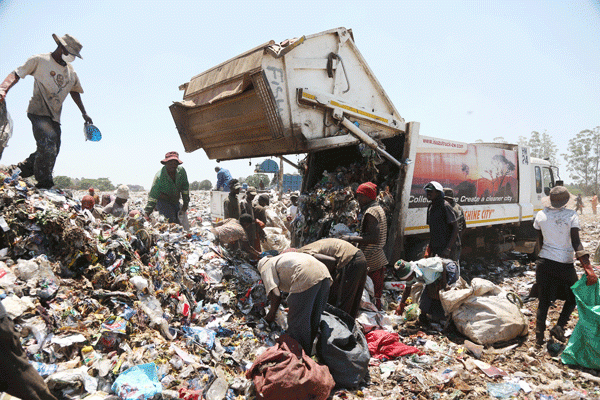
MOUNDS of garbage are becoming an ugly sight at many open spaces in both high and low-density suburbs in Zimbabwe.
It is regarded as normal to be exposed to a garbage dumpsite next to your home. Harare has become an eyesore with hordes of rubbish piling up at various open spaces.
The consequences are catastrophic with water bodies receiving maximum contamination. Cholera has circulated in the city and it is not showing any signs of remission.
More than 200 people have already lost their lives since February 12 when the first cholera cases were identified in Chegutu.
We should remain vigilant about the current cholera outbreak if we are to avoid a repeat of 2008 when the country recorded about 98 585 cases and 4 287 deaths within a space of nine months.
The 2019 cholera outbreak was milder with about 10 421 cases being recorded and about 69 people succumbing to the disease.
I recently drove along the road in Kuwadzana-Crowborough area in Harare and found nauseating mounds of rubbish that lined the road.
The situation is pathetic as garbage disposal seems to be done by anyone at a place of their choice.
- Veld fire management strategies for 2022
- Stop harassing media for reporting truth
- Veld fire management strategies for 2022
- News in depth: Mnangagwa’s push for $12 billion mining industry imperils communities
Keep Reading
What is surprising is that many people seem to be acclimated to the garbage around them.
Insects, rodents and other vectors have found themselves beautiful habitats for their reproduction.
The consequences are gut-wrenching indeed. Why do we have perennial issues of garbage disposal yet we have many office-bearers occupying opulent offices?
Are people getting into positions of authority for self-aggrandisement at the expense of robust service delivery?
National resources are milked daily yet there is no improvement in service delivery.
It was not long ago when President Emmerson Mnangagwa declared “A state of disaster’ in four Harare Metropolitan local authorities, namely Harare City Council, Ruwa, Epworth and Chitungwiza, due to their failure to collect and dispose of waste.
Epworth has experienced waste disposal misery with residents now dumping waste in rivers and vacant spaces, much to the detriment of people’s health.
With the rain seasons fast approaching, there is great potential to contaminate water bodies further and diseases like cholera, dysentery, typhoid will be difficult to contain once they start to sprout.
It is common knowledge that garbage has a high tendency to block water bodies and natural flows, thus becoming unwanted breeding sources for vectors such as mosquitoes that are very stubborn in malarial transmission.
Zimbabwe continues to lose people to preventable diseases which only needs our minimal efforts as a country.
Strengthening water infrastructure remains critical in reducing many of these communicable diseases.
Statutory Instrument 140 of 2023 has a potential to mitigate against poor waste management as the Environmental Management Agency (Ema) is now mandated to manage refuse collection and waste management within Greater Harare.
Funds from the Treasury will be used by Ema to coordinate the clearance of dumpsites across the province.
If Treasury avails the funds, then garbage should be a thing of the past.
Unethical practices like corruption and embezzlement of funds can hinder progress in any project and failure to address corruption will take us backwards as a country.
The Judiciary should not smile at all those who are implicated in corruption.
Councils have important roles to play in the mitigation and containment of cholera.
We cannot continue playing the blame game yet many lives are being lost on a daily basis.
People should also be reminded to practise good hygiene which include hand-washing with soapy water, and sanitisation.
It is very wise to shun suspicious water as it may be the source of vibrio cholerae, a toxin-producing bacterium.










